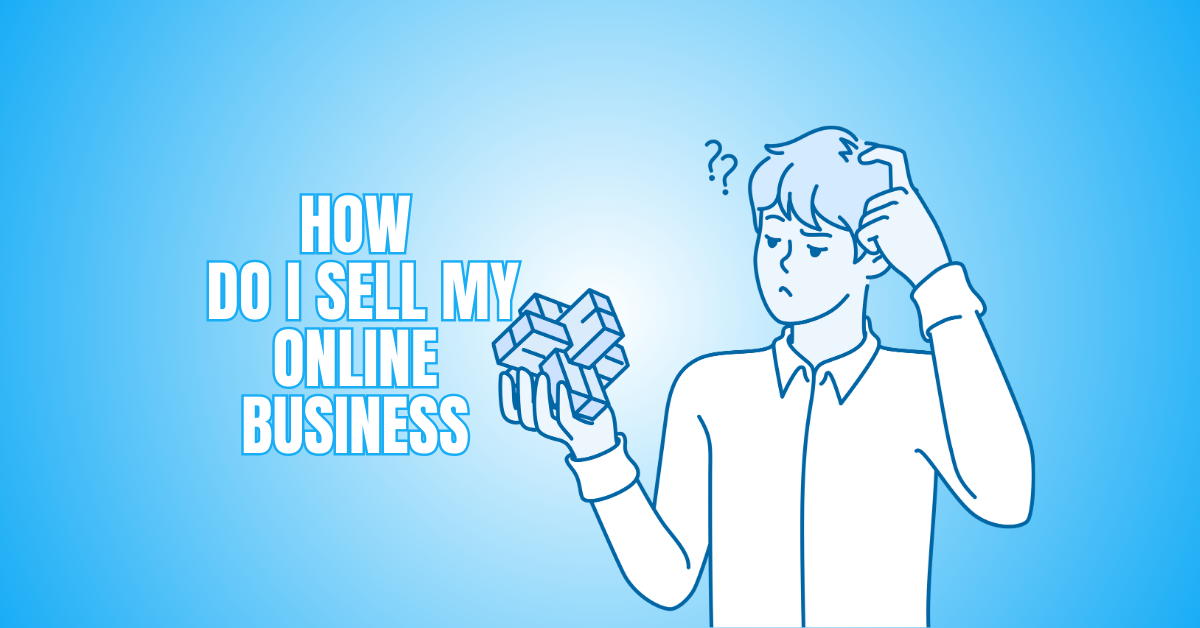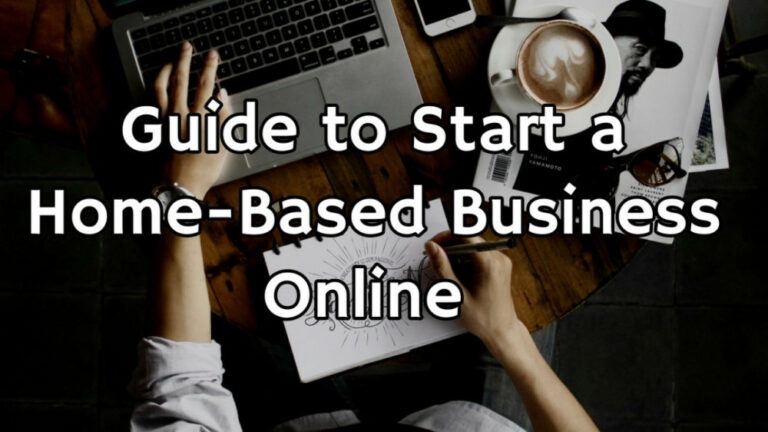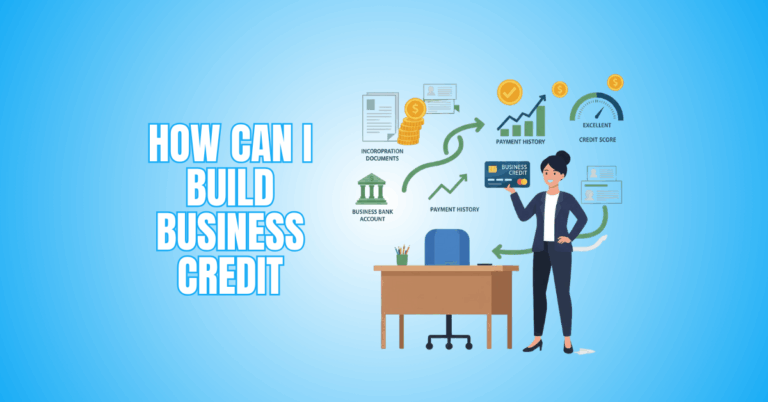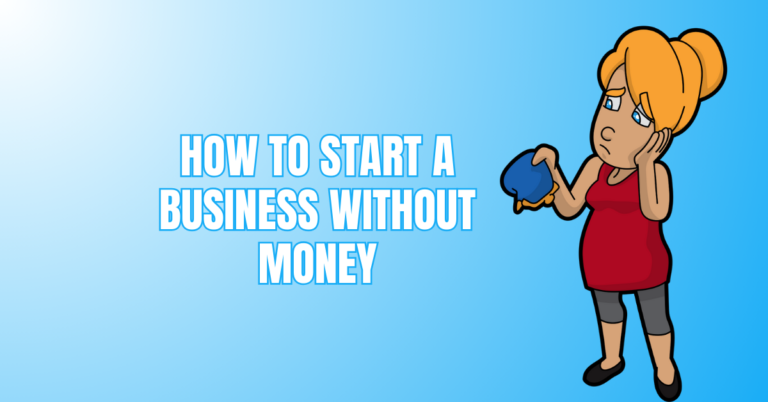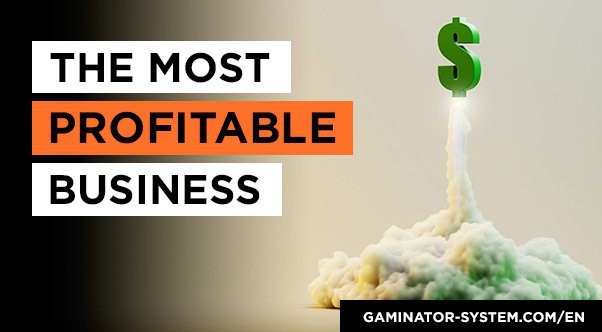How Do I Sell My Online Business
Selling your online business can feel like a big step, but with the right strategy, it can be smooth and rewarding.
Whether you’ve built an eCommerce store, blog, or digital service, knowing how to prepare, value, and market your business is key.
If you’re asking yourself How do I sell my online business, this guide provides step-by-step strategies to prepare, market, and close the sale successfully.
Let's dive into answering your question on How do I sell my online business successfully.
How Do I Sell My Online Business?
Step 1: Decide If You Are Ready To Sell
The first step in selling your online business is taking a real, honest look at yourself. Ask—am I ready for this? Do I want a clean break, or can I stay involved during a transition?
Can I emotionally let go of something I built? Many owners struggle here. Some hold on too tightly. Others rush and lose value. Both hurt the outcome.
Clearly state your objectives: are you looking for the best buyer, the fastest sale, or the best price? Write your answers down. Clarity now makes every decision that follows much easier and more rewarding.
Pro Tips
- Write goals to clarify why you want to sell.
- Check emotional readiness to detach from your business.
- Consider staying on during transition if needed.
- Get advice from trusted mentors or advisors.
Step 2: Understand What Buyers Look For
When selling your online business, buyers look for more than just profits. They want stability and growth potential. Check your revenue trends—show steady or rising income. Highlight strong profit margins, proving efficiency.
Explain where traffic comes from—SEO, ads, or social media. Showcase a loyal, repeatable customer base. Demonstrate systems that make the business easy to run, like automation tools or transparent processes.
If your company relies too heavily on you, consider documenting workflows or training materials. Doing this boosts buyer confidence, increases value, and makes your business easier to hand over. Preparation is key to a smooth, successful sale.
Pro Tips
- Highlight consistent revenue trends.
- Track and explain profit margins.
- Show diverse traffic sources.
- Document systems for smooth operations.
Step 3: Get Your Finances In Order
Financials are critical when selling your online business. Buyers need precise, accurate numbers to trust your company. Start by gathering income statements and reviewing all expenses.
Clean up any inconsistencies and use accounting software to track everything neatly. Make sure personal and business expenses are separated to avoid confusion.
If needed, hire a professional accountant—they can organize records, highlight profits, and prepare clear reports. Well-documented financials not only speed up the sale but also increase buyer confidence.
Take time now to make your books flawless, showing transparency and professionalism, which often leads to a higher selling price.
Pro Tips
- Separate personal and business expenses.
- Use accounting software for accurate records.
- Prepare income statements for past years.
- Hire an accountant for clarity and trust.
Step 4: Know Your Business Valuation
A critical first step before selling is figuring out how much your company is worth. Most online businesses are valued using a multiple of yearly profit, usually between 2x and 5x. For example, $100,000 profit with a 3x multiple means a $300,000 sale price.
Factors affecting the multiple include how long your business has been running, the niche, growth rate, traffic diversity, and customer loyalty. To estimate value, use online valuation tools for a quick idea.
For a more precise figure, consider hiring a professional broker—they can analyze your numbers, market trends, and help set a realistic, attractive price for buyers.
Pro Tips
- Compare similar businesses for market insight.
- Factor in growth potential.
- Use multiple valuation methods.
- Hire a broker for a professional appraisal.
Step 5: Increase Value Before You Sell
Before selling, take time to make your business more appealing. Minor improvements can significantly increase its value. Start by growing your email list to show a loyal audience. Improve SEO to boost organic traffic and visibility.
Automate repetitive tasks using tools or software, reducing daily involvement—document workflows so operations don’t rely solely on you.
Diversify income streams—multiple revenue sources make your business more stable and attractive. Buyers are drawn to companies that run smoothly without heavy owner input.
Implementing these changes shows professionalism, reliability, and growth potential, often leading to higher offers and a faster, smoother sale.
Pro Tips
- Automate key processes.
- Grow email lists.
- Diversify income streams.
- Improve SEO and traffic.
Step 6: Decide How To Sell
There are several ways to sell an online business, each with advantages and drawbacks. Selling through a broker means they handle listings, buyers, and negotiations, but they take a 10–15% commission.
Marketplaces like Flippa, Empire Flippers, or FE International give access to a large pool of buyers and are ideal for faster sales. A private sale allows selling directly to someone you know—no commission, but more effort.
Auctions can speed up the process, though prices may be lower. Choose your method based on goals: brokers for maximum value, marketplaces or auctions for speed and simplicity.
Pro Tips
- Compare broker fees vs benefits.
- Pick a marketplace fitting your niche.
- Consider private sales to trusted buyers.
- Auctions are fast but may offer a lower price.
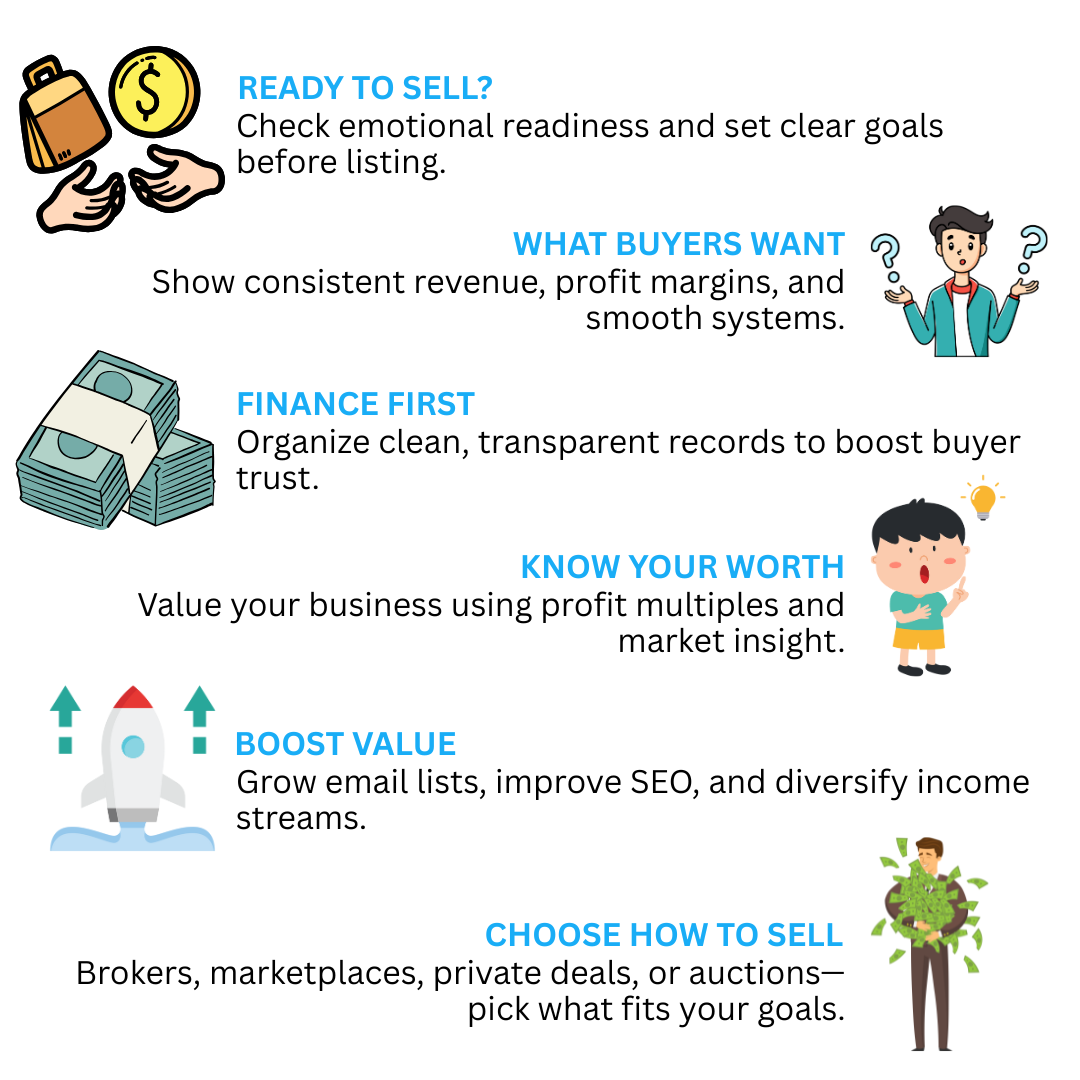
Step 7: Create A Great Listing
Think of your listing as a persuasive sales pitch for your online business. Start with a clear overview that explains what your company does and why it’s valuable.
Include detailed financials, showing profits, expenses, and trends. Highlight traffic sources—SEO, ads, or social media—to prove customer reach.
Outline growth opportunities to show potential for future expansion. Be honest about challenges; transparency builds trust with buyers. Include solutions or plans to address these issues.
Use clear, organized formats, like charts or bullet points, to make information easy to digest. A strong, transparent listing attracts serious, confident buyers.
Pro Tips
- Write a concise, compelling overview.
- Include transparent financials with charts.
- Explain traffic sources transparently.
- Be honest about challenges.
Step 8: Find The Right Buyer
Not all buyers have the same goals. Some look for quick profits, while others aim for long-term growth. It’s essential to qualify potential buyers before moving forward. Ask if they have the funds readily available so that the deal can close smoothly.
Check their experience in your niche to ensure they understand the market. Discuss their plan after purchase—will they grow the business or change its focus?
The right buyer appreciates your hard work and is committed to continuing its success. Qualifying buyers carefully protects your business and ensures a smoother, more rewarding transition.
Pro Tips
- Verify available funds.
- Check experience in your niche.
- Ask about plans.
- Choose buyers who value your work.
Step 9: Negotiate The Deal
Negotiation is a crucial stage in selling your online business—it determines your final price and terms. Start by knowing your bottom line so you don’t accept less than you’re comfortable with.
Be open to flexibility, like adjusting terms if the buyer offers a strong price. Consider creative options, such as installment payments or earn-outs, which can make deals easier for both sides.
Remember, negotiation isn’t just about money; it’s about building trust, agreeing on transition responsibilities, and ensuring a smooth handover. Take your time, act professionally, and strive for a solution that benefits both you and the customer.
Pro Tips
- Set a firm bottom line.
- Be flexible if the price is strong.
- Consider installments or earn-outs.
- Focus on trust and responsibilities.
Wealthy Affiliate – Mini Review (2025)
If you’ve ever thought about turning your blog, passion, or niche into an online business,
Wealthy Affiliate (WA) is one of the most beginner-friendly platforms I’ve used.
It combines step-by-step training, website hosting, SEO research tools,
and an active community all in one place.
What I like most: you can start free (no credit card needed),
explore lessons, test the tools, and connect with other entrepreneurs
before upgrading. WA isn’t a “get rich quick” scheme — it’s a platform where success comes
from consistent effort and applying what you learn.
Step 10: Handle Legal Documents
Selling an online business requires proper legal documents to protect both parties. A Letter of Intent (LOI) detailing the buyer's offer and the essential terms should be the first step.
Prepare an Asset Purchase Agreement detailing what’s being sold, including assets and liabilities. Include a Non-Compete Agreement to prevent the seller from starting a competing business.
Make sure all accounts, domains, and intellectual property are correctly transferred. Hiring a lawyer who understands online business sales is highly recommended—they ensure all contracts are valid, protect your interests, and prevent future disputes. Proper legal preparation makes the sale smoother, safer, and more professional for everyone involved.
Pro Tips
- Use a Letter of Intent.
- Prepare an Asset Purchase Agreement.
- Include a Non-Compete.
- Hire a lawyer for protection.
Step 11: Transfer The Business Smoothly
After selling your online business, a smooth handover is essential. Transfer all website access, hosting accounts, and social media pages to the buyer.
Share customer lists and supplier contacts so operations continue without disruption. Many buyers appreciate training or guidance during this transition, especially if systems are complex.
Determine beforehand how many days, weeks, or months you are willing to be involved. Document processes, create guides, and provide clear instructions to make the handover easier.
A well-planned transition builds buyer confidence, protects your reputation, and ensures the business continues thriving after you step away.
Pro Tips
- Transfer website and hosting access.
- Share customer and supplier contacts.
- Provide clear guides for operations.
- Decide the support period for the buyer.
Step 12: Celebrate Your Exit
Once the sale is finalized, pause and celebrate—you’ve done something remarkable. Selling your online business is a significant achievement and the result of years of hard work.
Take a moment to reflect on your journey and acknowledge your efforts. Some entrepreneurs use the proceeds to reinvest in new ventures, explore fresh opportunities, or start another business.
Others take a well-deserved break to relax and recharge. Whatever path you choose, appreciate this milestone.
Document lessons learned, share your experience, and enjoy the freedom or resources gained. This is the reward for your dedication, planning, and perseverance.
Pro Tips
- Reflect on achievements.
- Plan the use of proceeds wisely.
- Take time to relax.
- Document lessons learned for future ventures.
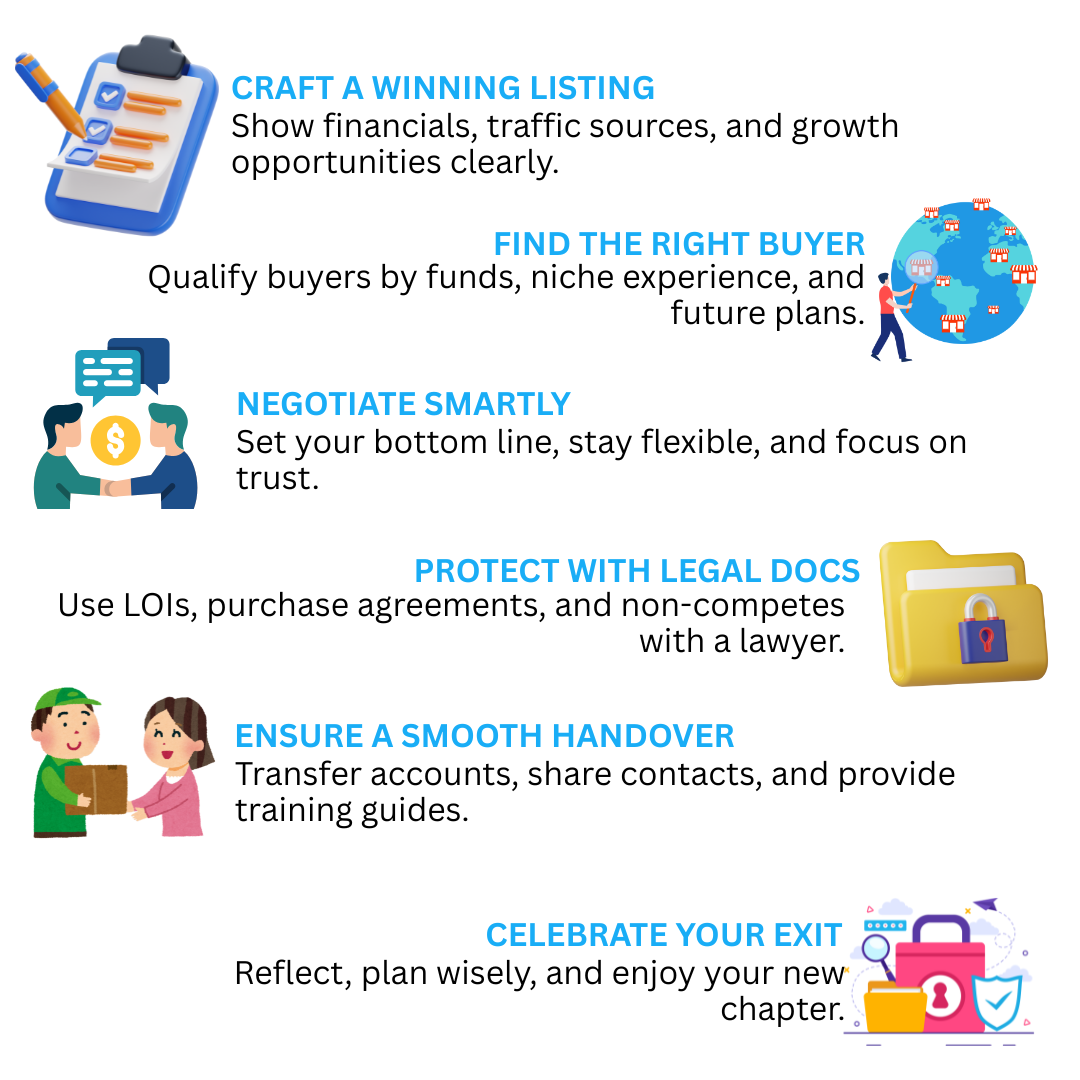
Typical Errors to Avoid When Selling Your Online Business
Selling an online business can be exciting, but it’s easy to make mistakes that can cost time, money, or even the sale itself. Understanding common pitfalls helps you navigate the process smoothly and maximize your profits.
Here’s a comprehensive guide to mistakes to avoid.
1. Rushing The Sale
Many business owners want a fast exit. While speed can be tempting, rushing often leads to undervaluing the business. Buyers may sense desperation, lowering offers. Take time to prepare.
Clean up financials, optimize operations, and ensure your business looks attractive. Waiting a few months to improve metrics can increase your selling price significantly. A well-planned sale is always more profitable than a rushed one.
2. Overvaluing Your Business
It’s natural to feel attached and think your business is worth more than it is. Overpricing can scare away buyers. Research similar businesses in your niche to understand realistic market value.
Consider professional valuations or broker advice. Be honest about revenue, growth potential, and challenges. Correct pricing attracts serious buyers quickly, while unrealistic prices stall your sale and waste time.
3. Messy Financial Records
Financial clarity is critical. Buyers need accurate, organized financials to trust the business. Messy books, missing income statements, or mingled personal and business expenses raise red flags.
Prepare clean records, track profits and expenses, and use accounting software if needed. Hiring a professional accountant can ensure everything is correct and professional. Transparent finances build trust and increase sale value.
4. Hiding Problems Or Risks
Transparency is key. Some owners hide challenges or underreport issues, thinking it will help the sale. The opposite is true. Buyers can uncover problems during due diligence.
Be upfront about risks and provide solutions or plans to address them. Honesty builds trust and often leads to smoother negotiations. It also prevents future disputes after the sale.
5. Ignoring Buyer Qualifications
Not all buyers are equal. Selling to the wrong person can lead to failed deals or unhappy outcomes. Always qualify buyers. Check if they have funds ready, understand your niche, and have a clear plan for the business.
Choosing the right buyer ensures your business continues successfully and maintains its reputation, which is especially important if you’re partially involved after the sale.
6. Neglecting Legal Protections
Some sellers skip proper legal contracts to save time or money. This is risky. Missing a Letter of Intent, Asset Purchase Agreement, or Non-Compete can create legal disputes later.
Always work with a lawyer familiar with online business sales. Proper contracts protect both you and the buyer, ensuring a smooth, secure transaction.
7. Overlooking Transition Planning
After the sale, the handover is critical. Failing to provide clear instructions, access to accounts, or training can frustrate buyers.
Decide how long you’ll stay involved and create guides for operations. In addition to protecting your reputation and reassuring purchasers, a seamless transfer may even raise the sale price.
8. Emotional Attachment
Selling a business you’ve built is emotional. Attachment can cloud judgment, leading to poor decisions like refusing reasonable offers or overestimating value.
Separate emotions from business decisions. Focus on the sale objectively and professionally. Accept that letting go is part of the process, and a clear mind improves negotiation and decision-making.
9. Poor Marketing Or Listing
Your listing is the first impression for buyers. A vague or poorly presented listing can scare them off. Include a clear business overview, financials, traffic sources, and growth opportunities.
Use professional visuals and highlight strengths. A compelling, honest listing attracts serious buyers faster and improves sale chances.
10. Ignoring Tax Implications
Many sellers overlook taxes, which can reduce net profits unexpectedly. Understand your local tax rules for business sales and plan accordingly.
To minimize surprises, seek advice from a tax adviser. Effective tax planning can increase the profitability of your sale and save a substantial amount of money.
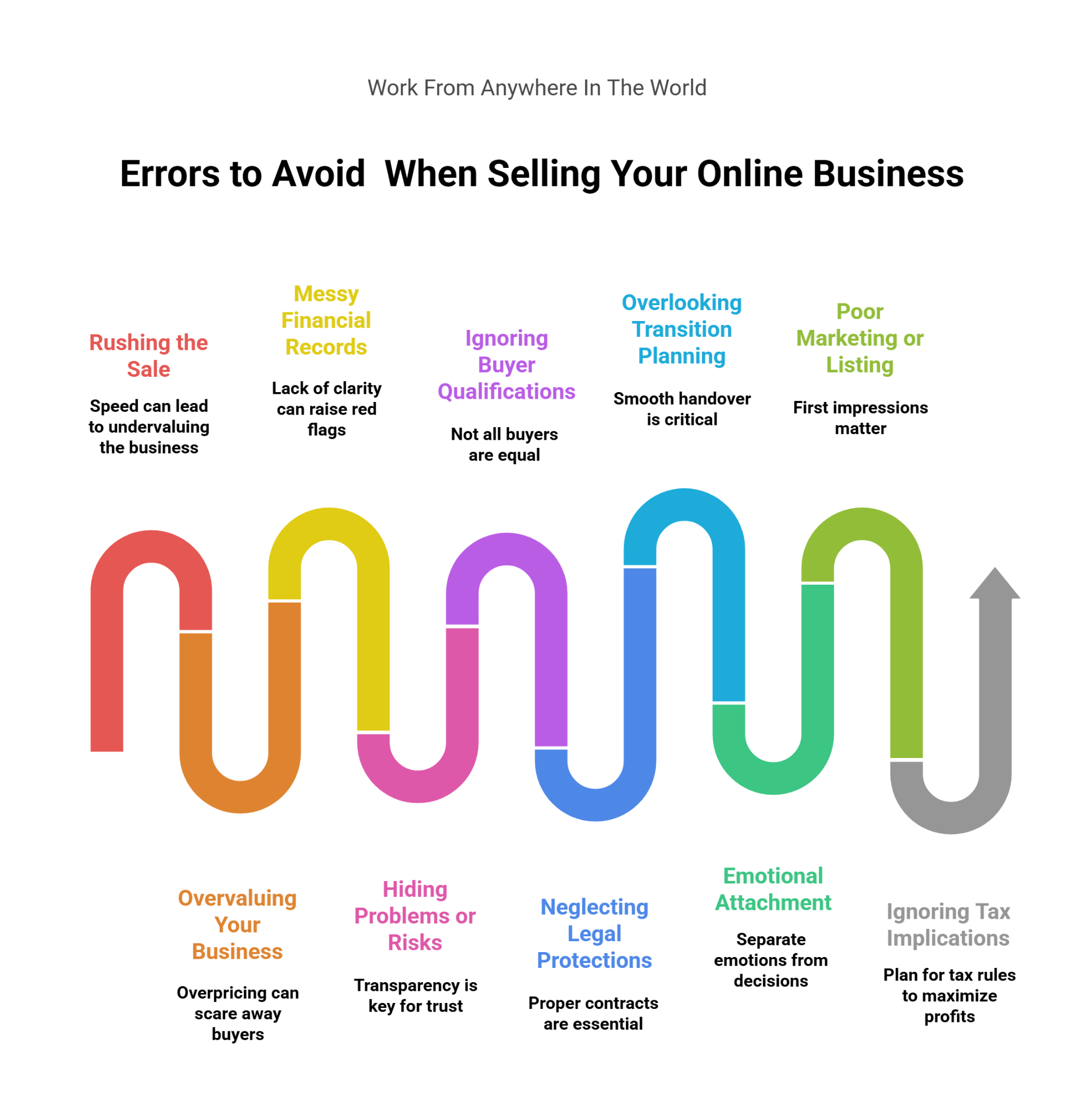
FAQs
1. How Do I Know If My Online Business Is Ready To Sell?
Your business is ready to sell if it has consistent revenue, clear financial records, a loyal customer base, and minimal dependence on you. Buyers look for online businesses with proven systems and growth potential.
2. How Much Is My Online Business Worth?
Most online businesses are valued at 2–4 times their annual net profit. Factors like niche, traffic sources, brand strength, and scalability affect the final price. A professional valuation or broker can give a more accurate figure.
3. Do I Need A Broker To Sell My Online Business?
A broker isn’t required, but can help if you want expert guidance. They handle valuations, negotiations, and buyer vetting, but usually charge a 10–15% commission. For smaller businesses, marketplaces or private sales may be more cost-effective.
4. What Documents Will Buyers Want To See?
Expect to provide financial statements, traffic reports, customer data, supplier contracts, and operational procedures. Having these ready increases buyer confidence and can lead to a faster sale.
5. Should I Tell My Employees Or Customers I Am Selling?
It’s best to keep the sale confidential until the deal is finalized. Sudden announcements may unsettle staff or customers. Once the buyer is secured, you can plan a smooth transition.
6. How Do I Make My Business More Attractive To Buyers?
Improve profitability, reduce owner involvement, and diversify traffic and income streams. Clean financials and well-documented systems show buyers that your business is low-risk and scalable.
7. Will I Have To Stay Involved After Selling?
Many buyers request a transition period (usually 30–90 days) to help them learn operations. The length depends on the agreement, but you may be compensated for extended support.
8. What Taxes Will I Pay After Selling My Online Business?
Taxes depend on your country’s laws, the sale structure (asset vs. stock sale), and your business entity type. It’s wise to consult a tax professional before closing the deal.
Conclusion
Selling your online business is a significant milestone that requires preparation, strategy, and patience. You may reduce stress and increase profit by:
- Sorting out your finances,
- Figuring out how much your online business is worth,
- Finding the proper buyer, and
- Making sure the transition goes smoothly.
Avoid common mistakes, be transparent, and focus on long-term outcomes.
If you’re asking yourself How do I sell my online business, following the proper steps ensures a smooth, profitable, and successful sale. With careful planning, selling your online business can be a rewarding and empowering experience.
I trust you enjoyed this article on How Do I Sell My Online Business. Please stay tuned for more insightful blogs on affiliate marketing, online business, and working from anywhere in the world.
Take care!
— JeannetteZ
💬 Your Opinion Is Important To Me
Do you have thoughts, ideas, or questions? I’d love to hear from you. Please leave your comments below or email me directly at Jeannette@WorkFromAnywhereInTheWorld.com.
📚 More Work From Anywhere Reads
🚀 Ready to Build a Business You Can Run from Home
or from Anywhere in the World?
Imagine creating income on your terms — from home, a cozy café, or wherever life takes you.
With the right tools, training, and community support, it’s entirely possible.
Start your own online business for free — no credit card needed.
Disclosure
This post may contain affiliate links. As an Amazon Associate and participant in other affiliate programs, I earn from qualifying purchases at no extra cost to you. Please read my full affiliate disclosure.

